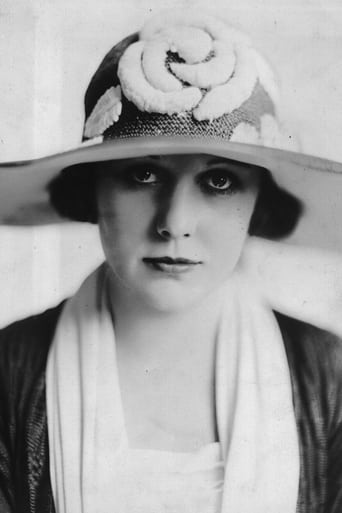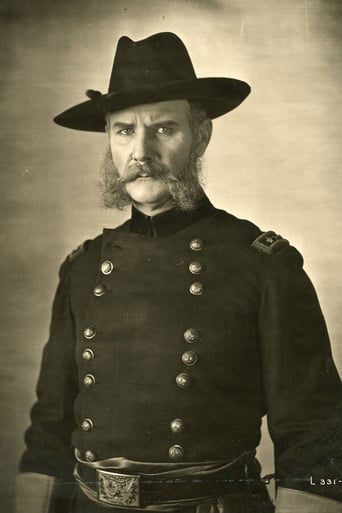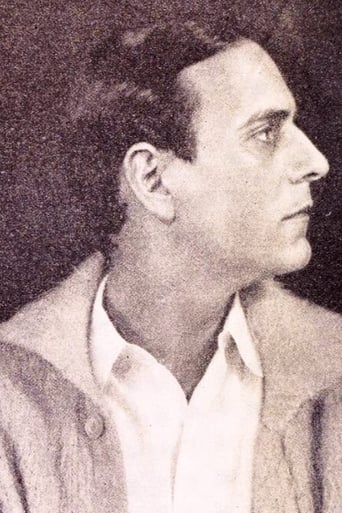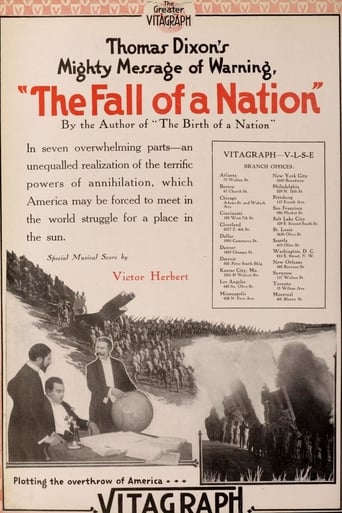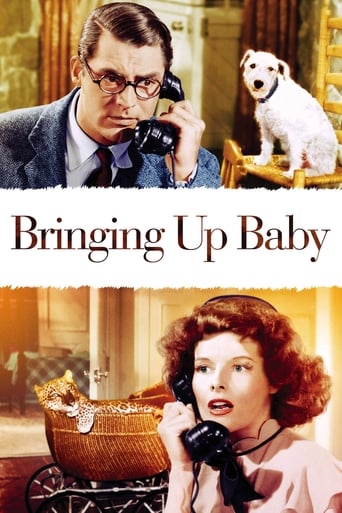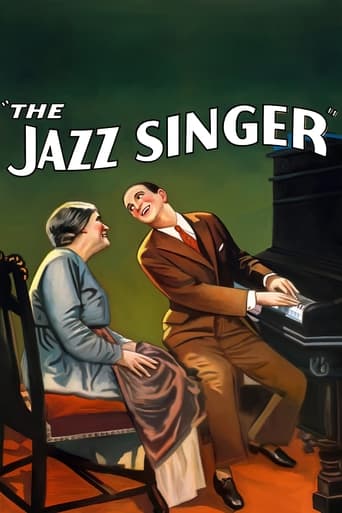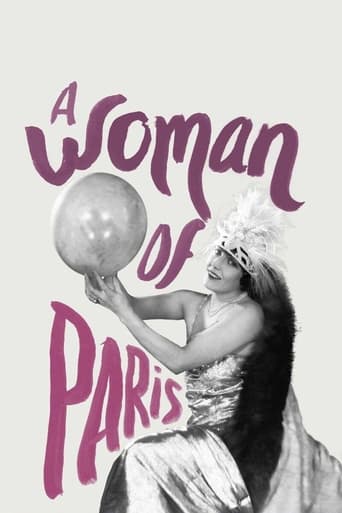
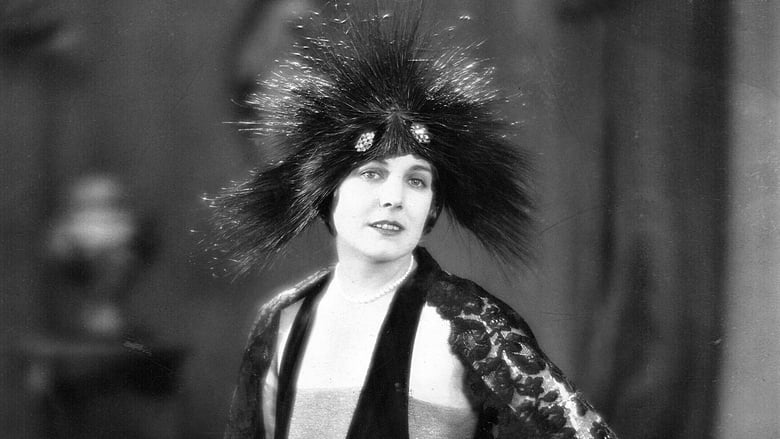
A Woman of Paris: A Drama of Fate (1923)
When Marie St. Clair believes she has been jilted by her artist fiance Jean, she decides to leave for Paris on her own. After spending a year in the city as a mistress of the wealthy Pierre Revel, she is reunited with Jean by chance. This leaves her with the choice between a glamorous life in Paris, and the true love she left behind.
Watch Trailer
Cast
Similar titles

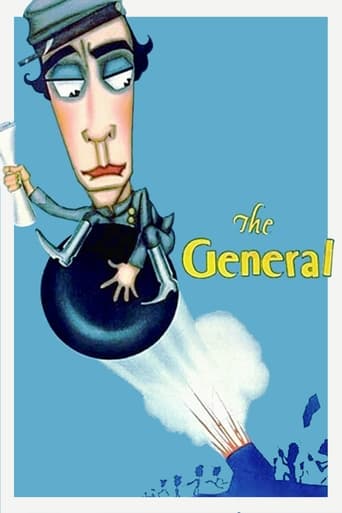

Reviews
Purely Joyful Movie!
Load of rubbish!!
How sad is this?
good back-story, and good acting
A Woman of Paris: A Drama of Fate gives us a familiar little story: do you pick the man with the money or the man with the artistic drive and heart (and not really much money)? It's also set in the 1920's since it is, you know, from that decade, but it helps that Charlie Chaplin, in his one and only true dramatic offering, sets it in the milieu of Paris, France of the early 20's when things were bright and alive and Champagne flowed and people danced and so on. It fits to have this story here, and all of the actors are game for it. Ultimately, this may not be the most original story, as it follows a woman who is kicked out of her home (because, in brief, it sucks as we're told) and goes to Paris in a moment of high dramatic tension and then ends up being attached to one man (Menjou) while the other does come to town and becomes a painter. And lordy-lord it has some exceptionally melodramatic beats.But Chaplin's light touch connects well with a honestly dramatic and even existential story of a woman caught in a question of choice, and how the choices of the two men (one who is too guilt-ridden over his mother, the other who has no guilt about anything, certainly not the fact that he's made this woman the "other" woman) are wonderfully well drawn, and the performance by Purviance makes her akin to Diane Keaton to his Woody Allen (and there's Adolphe Menjou, who revels in being a high-society cad). Oh, and the music, while a bit repetitive, is also a great fit for the material.
It takes a very out-of-character film to be the oddest of a filmmaker's career that includes Monsieur Verdoux. Not featuring Charlie Chaplin himself, it's not really a surprise that A Woman Of Paris: A Drama Of Fate wasn't popular back in the day, but that doesn't mean it's not a good film. In fact, it's a great one. Though it's hard to say what version the 1920s audience watched as Chaplin re-edited and re-scored it at the end of his career in the 1970s, he certainly knew there was a gem in there somewhere. It's one of his most tightly wound and compelling films. Although you never feel particularly close to the protagonists, their characterisation is quite complex and fascinating for a film of this era. It has brilliant ironic scenes such as where the 'woman' throws something valuable about of a window to prove she doesn't need possessions then chases down someone who innocently picks it up. It adds a lot of layers to his usually simple style and gives a mature approach to the dilemma of living for money or love. Although it has plenty of tragedy and comedy, the only issues are the sappy ending that comes out of nowhere and confusing motivations from the fiancé. Otherwise, it's belongs among his finest films and, dare I say, features his best composed score of his whole career. Chaplin certainly began and ended on high notes.8/10
I was looking in Charlie Chaplin's memoirs and I found that his original idea for the plot of A Woman Of Paris came from pillow talk with Peggy Hopkins Joyce involving one of her former boyfriends, a French publisher. From this came Charlie's idea to direct, but not appear in a film and hopefully make his long time leading lady from slapstick comedy, Edna Purviance a major dramatic star.The reason given for the non-success of A Woman of Paris is usually given as the fact that people bought tickets and were disappointed that they did not see a Charlie Chaplin comedy. Probably on the silent screen, star images were even more fixed in people's minds than they were when sound came in.But seeing it today it really does go overboard into melodrama. Edna's a simple country girl who loves Carl Miller, a struggling artist. Some blind mischances of fate and she winds up the paid woman of Parisian rake Adolphe Menjou. It's the tragedy of one romantic and the salvation of sorts for the other that are the basis of the story.You couldn't make a film like it today, audiences would just laugh at it. In 1923 audiences were looking for laughs attached to the Chaplin name and found none. Edna does a fine job, but the public would not accept her in a drama. Adolphe Menjou as the rake comes off best in the cast.The film ironically enough was Chaplin's first for the newly formed United Artists of which he was a quarter interest partner. After this one failed at the box office, he went back to cranking out the comedies we expected from him.Back when I was working person at New York State Crime Victims Board, I had a claimant named Wayne Purviance who was the victim of an anti-gay bias attack in 1982. It was a crime that galvanized the GLBT people of New York City, this person in particular. Wayne was the grand nephew of Edna Purviance.He's no longer among the living, but to you Wayne Purviance who took some real blows for millions of people, this review is lovingly dedicated to you and your wonderful aunt.
The second film in my somewhat unusual Charles Chaplin double feature (after the delightfully black 'Monsieur Verdoux (1947)'), 'A Woman of Paris' is perhaps the silent comedy master's least mentioned film, perhaps partly due to it not actually being a comedy, or because Chaplin himself appears only in a very brief cameo role. His first and, I'll venture, his only strictly dramatic feature, the film traces the romantic dilemma of a young French woman living in Paris. It was Chaplin's first film with United Artists which he had founded in 1919 with Douglas Fairbanks, Mary Pickford and D.W. Griffith. Originally entitled 'Public Opinion' and then 'Destiny,' Chaplin considered a dozen more titles before he finally settled on a name.Marie St. Clair (Edna Purviance) and her romance Jean Millet (Clarence Geldart), an aspiring artist, residents of a small French village, have plans to move to Paris and get married. However, unfortunate circumstances delay their plans, and Marie impulsively boards the train without Jean. A year or so later, Marie has assimilated into the upper-class lifestyle of Paris, having become the mistress of a wealthy, cynical businessman, Pierre Revel (Adolphe Menjou). It is then that she and Jean suddenly meet again. Though there are undoubtedly still feelings between them, Marie must decide whether she can sacrifice all of Pierre's luxuries to pursue the man that she loves.Written, produced and directed by Chaplin, 'A Woman of Paris' is a tightly-paced drama/romance, employing a lot of dialogue (somewhat unusual for Chaplin, who usually relied on extended slapstick comedic set pieces to drive his silent films) and a three-way relationship that has since become commonplace in films of this sort. The film allowed Chaplin to extend his skills beyond the realm of the lovable little Tramp. Unfortunately, this seemingly was not what audiences wanted. Perhaps perceived as a harmful satire of the American way of life, 'A Woman of Paris' was banned in several US states on the grounds of immorality, and it was a commercial flop. Chaplin had conceived the film as a means of launching the individual acting career of Edna Purviance, though this bid was unsuccessful. It did, however, make an international star of Adolphe Menjou.Many critics, despite the poor box office performance, praised the film's startling realism. Notably, director Michael Powell ('Black Narcissus,' 'Peeping Tom') cited 'A Woman of Paris' as his greatest inspiration to become a filmmaker. In 1976, a frail Charles Chaplin just one year before his death reissued the edited film with a new musical score he had composed, aided by music arranger Eric James. A criminally underrated silent classic, 'A Woman of Paris' is yet another testament to Chaplin's undeniable cinematic genius.
